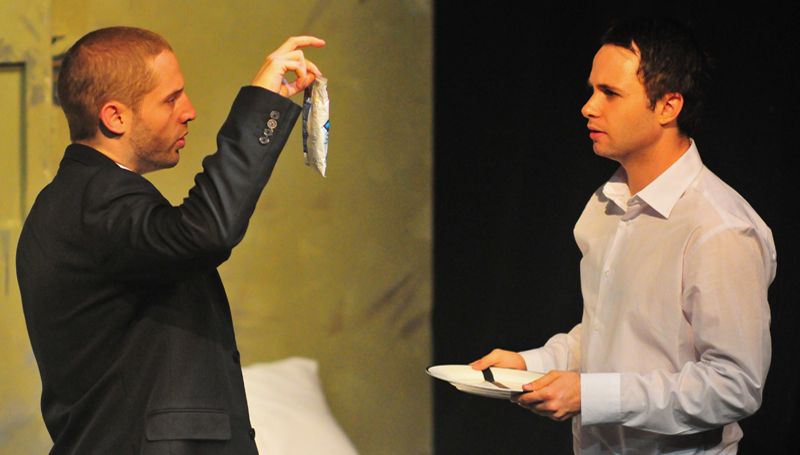“The Dumb Waiter”, Edinburgh Fringe
Jeremy Malies on North Bridge, Edinburgh
Do the bizarre written requests for food sent down to the cellar in The Dumb Waiter form coded signals to Ben, the senior gangster, as to when and how he will be required to kill Gus the nervy junior hitman? It’s one of the ways I choose to view the play but I’m not bright enough to have come up with this interpretation myself.

Jonny Collis-Scurll as Ben and Pete Sowerby as Gus. Photo credit: Rob Marshall.
Adam Slepowronski of the Lincoln Company is alive to all the signposting in the action but avoids telegraphing anything in his direction of Pinter’s 1957 work at the Surgeons Hall in Edinburgh. Part of the charm of Edinburgh is that you never know the layout of buildings and there could indeed be a restaurant above this black box stage on North Bridge especially since the carpentry for the titular food delivery device is outstanding.
The production is by the Fresh Motion Theatre Company who draw on final year students from Lancaster University. Ben, played by Jonny Collis-Scurll, radiates superficial calm as he lies on his camp bed seemingly happy to read and re-read a tabloid newspaper and speculate on which football teams might be playing at home in Birmingham that day. This is one of the signature set-piece speeches of the play which the pair of actors – Pete Sowerby plays Gus – negotiate adeptly amid the hard edge of the action and its brooding threat of violence.

Pete Sowerby as Gus and Jonny Collis-Scurll as Ben. Photo credit: Rob Marshall.
We empathize with Gus who appears a loose cannon and unsuited to this work. His exit from it is of course unplanned as far as he is concerned. Sowerby is skilful in showing how the cogs are beginning to whir; he is suspicious about events on the way to the cellar where he may have been sized up by yet another thug. Gus progresses to a state of terror as more and more discrepancies appear in preparations for what should be a routine contract killing. We are soon on his side and the denouement is more than usually upsetting. By contrast, is Ben just a loyal foot solider or has he been threatened by the sinister unseen Wilson?
I never interviewed Pinter but spectated at his cricket matches a few times and found him forbidding. If I ever felt any empathy with him it was prompted by his constant plea that the plays were funnier than audience behaviour and critical consensus suggest. Here, Collis-Scurll and Sowerby have the laughter finely calibrated and can adjust it at will. There are no laboured pauses and exploitation of dead air, no lazy exploitation of “comedy of menace” – a blanket term at best – and the result is Pinter for purists. There’s a musicality and rhythm to the delivery of the dialogue and we all end up in a heightened nervous state induced by this fine young company.
For the first time, I realized the play’s debt to Beckett. We might be examining a power struggle and searching for evidence of a forthcoming twist but primarily, this is a piece about killing time while little happens. Slepowronski shows judgement when controlling what can often prove heavy-handed dramatic irony for anybody who has seen the play before.
An extra technical rehearsal with props would have benefited the flow but the narrative is always crisp. This is a faithful but at no time reverential treatment of an iconic play that never seems dated. Pinter was consciously working in a compressed form and the general economy is well suited to young companies on Fringe projects.








